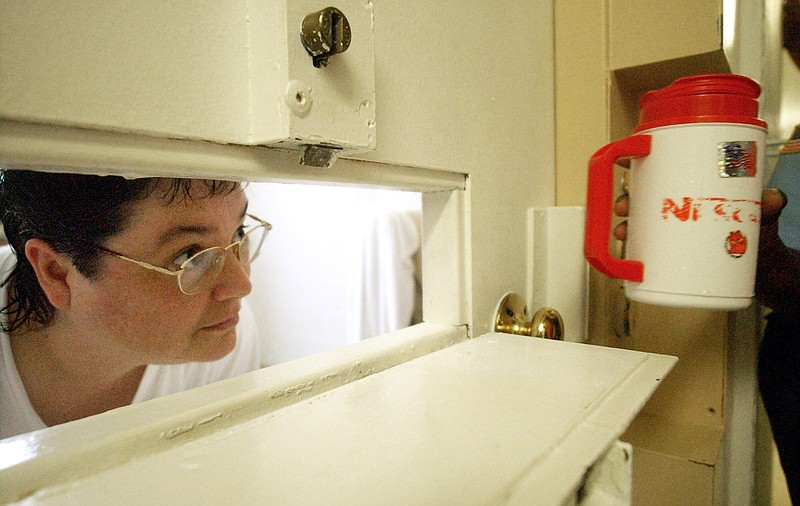ATLANTA - A court on Friday set a seven-day execution window for Georgia's only female death row inmate, whose execution was halted in March because of a problem with the lethal injection drug.
A Gwinnett County Superior Court judge issued an order Friday saying Kelly Renee Gissendaner may be executed between noon on Sept. 29 and noon on Oct. 6, Attorney General Sam Olens said in a news release.
Gissendaner would be the first woman executed by the state in 70 years. She was convicted of murder in the February 1997 slaying of her husband, Douglas Gissendaner. Prosecutors said she conspired with her lover, Gregory Owen, who stabbed Douglas Gissendaner to death. Owen is serving a life sentence.
State officials on March 2 called off the scheduled execution of Kelly Renee Gissendaner "out of an abundance of caution," saying the lethal injection drug they intended to use appeared "cloudy." Corrections officials temporarily suspended executions in the state until a drug analysis could be done.
Corrections officials in April released lab reports, a sworn statement from a pharmacological expert hired by the state and a short video showing a syringe of clear liquid with chunks of a white solid floating in the solution.
"After viewing a video of the solution and learning about the shipment and storage of the solution, my assessment of the formulation indicates that pentobarbital had precipitated or fallen out of solution," University of Georgia College of Pharmacy professor Jason Zastre wrote in a sworn statement released by the department.
 FILE- In this Nov. 18, 1998 file photo, Kelly Gissendaner in shown in court for her murder trial in Lawrenceville, Ga. Prison officials in Georgia made a last-minute decision to delay the execution of inmate Kelly Gissendaner because the lethal drug appeared cloudy, raising questions about whether it would work. Now that decision has prompted a legal challenge to a secrecy law in Georgia that bans the government from releasing any information about where it gets its death penalty drugs. (AP Photo/Atlanta Journal-Constitution, Richard Fowlkes, File) MARIETTA DAILY OUT; GWINNETT DAILY POST OUT; LOCAL TV OUT (WXIA, WGCL, Fox 5)
FILE- In this Nov. 18, 1998 file photo, Kelly Gissendaner in shown in court for her murder trial in Lawrenceville, Ga. Prison officials in Georgia made a last-minute decision to delay the execution of inmate Kelly Gissendaner because the lethal drug appeared cloudy, raising questions about whether it would work. Now that decision has prompted a legal challenge to a secrecy law in Georgia that bans the government from releasing any information about where it gets its death penalty drugs. (AP Photo/Atlanta Journal-Constitution, Richard Fowlkes, File) MARIETTA DAILY OUT; GWINNETT DAILY POST OUT; LOCAL TV OUT (WXIA, WGCL, Fox 5) The most likely cause of the formation of solids is that the solution was shipped and stored at a temperature that was too low, Zastre wrote. Another possible cause could be that the pharmaceutical solvent used to dissolve pentobarbital sodium during the compounding process could have either absorbed some water or evaporated during preparation, he wrote.
In a court filing in June, the department revealed that it did its own test on a new batch of pentobarbital made by the same compounding pharmacist who made the drug meant for Gissendaner's execution.
Department of Corrections' chief of special projects, William King, stored one sample in a refrigerator at 34 degrees and one in a room where the temperature fluctuated between 67 degrees and 72 degrees for 11 days, from March 24 to April 3. He checked them every day except for two days over a weekend and recorded the temperature and appearance and took a photo of the samples.
No changes were recorded in either sample. Both started and ended as clear liquid with no solids.
Gissendaner's lawyers had filed a complaint in federal court a week after her scheduled execution date saying the state was violating her constitutional rights. In a filing in June they argued that the state's own test didn't support its cold storage theory, which strengthened their argument that Gissendaner should not be put to death until a judge determines her rights won't be violated.
The state countered that state officials consulted with Zastre and he said pentobarbital does not always precipitate when it is stored at a temperature that is too cold and that Gissendaner's lawyers provided no scientific evidence to show that the state's explanation isn't correct.
The judge last month dismissed Gissendaner's complaint. Her lawyers earlier this month asked the judge to reconsider that ruling.
